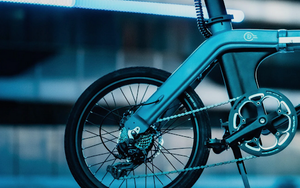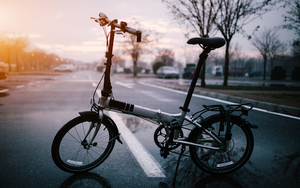Are Electric Scooters Legal in the UK?
Nov 22, 2023
List of Contents
- Are electric scooters legal in the UK?
- Understanding the UKs transportation laws
- The legal status of electric scooters in the UK
- The penalties for illegal electric scooter use
- The future of electric scooter legislation in the UK
- Safety considerations for electric scooter users
- Electric scooter statistics
Are Electric Scooters Legal in the UK?
Electric scooters have become increasingly popular in recent years as a convenient and eco-friendly mode of transportation. However, there is much confusion surrounding their legal status in the UK. In this article, we will delve into the intricacies of the country's transportation laws and shed light on the current legislation regarding electric scooters. Furthermore, we will explore the penalties for illegal scooter use and discuss the future of electric scooter legislation in the UK. Lastly, we will address safety considerations for electric scooter users, including recommended safety gear and safe riding practices.
Understanding the UK's Transportation Laws
The UK has a comprehensive set of laws and regulations governing various modes of transportation, including electric bikes and scooters. These laws ensure the safety and efficiency of transportation systems across the country. When it comes to electric scooters, they fall under the category of Personal Light Electric Vehicles (PLEVs). PLEVs are defined as vehicles that have a maximum speed of 25km/h (15.5mph) and are propelled by an electric motor.
The Definition of Personal Light Electric Vehicles (PLEVs)
To be classified as a PLEV, an electric scooter must meet certain criteria established by the UK government. These criteria include a maximum power output of 500 watts and a weight limit of 55 kilograms (121 pounds). Additionally, the scooter must have working lights, reflectors, and indicators, ensuring visibility and safety on the roads. The Nanronot Lightning 2.0 electric scooter offers dual 800W motors and can reach speeds of up to 30mph.
Furthermore, PLEVs are required to have a horn or bell to alert pedestrians and other road users. This ensures that riders can effectively communicate their presence and intentions, promoting overall safety on the streets.
Moreover, PLEVs must have a valid registration with the Driver and Vehicle Licensing Agency (DVLA). This registration process helps authorities keep track of PLEVs and ensures that they meet the necessary safety standards.

Current Legislation on Motor Vehicles
Under the current UK legislation, electric scooters are considered motor vehicles. This means that they must comply with the same rules and regulations as other motor vehicles, such as cars and motorcycles. As a result, electric scooters are subject to several restrictions regarding where they can be used.
Prohibited Use on Pavements
One of the key restrictions is that electric scooters cannot be ridden on sidewalks or pavements. They are only permitted to be used on roads and cycle lanes. This rule aims to prevent accidents and ensure the safety of pedestrians on footpaths.
Over 16s & Valid Driving Licence Only
Additionally, riders of electric scooters must be at least 16 years old and hold a valid driving licence or a provisional licence. This requirement ensures that riders have a basic understanding of road rules and safety measures.
Stay Away From Motorways
Furthermore, electric scooters are not allowed on motorways or dual carriageways. These high-speed roads are designed for larger vehicles and may pose a significant risk to electric scooter riders. By restricting their access to such roads, the legislation aims to protect the safety of riders and other road users.
It is important to note that the UK government is continuously reviewing and updating transportation laws to accommodate new technologies and ensure the safety of all road users. Therefore, it is advisable for electric scooter riders to stay informed about any changes in legislation to avoid any legal complications.

The Legal Status of Electric Scooters in the UK
Despite their rising popularity, the use of electric scooters in the UK remains complex and subject to various legal considerations. The primary factors determining their legal status are the type of land on which they are used: private land or public roads and pavements.
Private Land Usage
On private land with the owner's permission, electric scooters can generally be used legally. However, it is still important to exercise caution and adhere to any specific rules or regulations put in place by the landowner. The Ducati Srambler Cross-E electric scooter makes for the perfect off-road ride.
Public Roads and Pavements
Using electric scooters on public roads and pavements is currently illegal in the UK. These restrictions are in place because electric scooters do not meet the requirements necessary for legal road use, such as having proper lighting and registration plates. Therefore, riding an electric scooter on public roads or pavements can result in penalties and fines.

The Penalties for Illegal Electric Scooter Use
As mentioned earlier, riding an electric scooter on public roads or pavements is illegal in the UK. Those caught violating this law can face fines and penalties, which vary depending on the severity of the offence.
Fines and Penalties
Currently, the penalty for riding an electric scooter on public roads or pavements is a fixed fine of £300. This fine can be issued by the police and carries six penalty points on the rider's driving licence. Additionally, the scooter itself can be impounded.
Implications for Insurance
Another important aspect to consider is insurance coverage. Since electric scooters are not legally allowed on public roads, they do not fall under the purview of motor vehicle insurance policies. Therefore, riders may not be covered in case of accidents or damages, potentially leaving them financially vulnerable.
The Future of Electric Scooter Legislation in the UK
The UK government has recognised the increasing presence of electric scooters in urban environments and is actively exploring ways to regulate their use effectively. As part of ongoing pilot programs, electric scooters have been made legal in certain regions, including rental schemes in select cities.
Proposed Changes to the Law
Proposed changes to the current legislation aim to create a framework that allows electric scooters to be used legally on public roads and pavements. This would involve establishing licensing requirements and implementing safety regulations, such as mandatory helmet use.
Public Opinion on Electric Scooter Legalisation
Public opinion regarding the legalisation of electric scooters remains mixed. Proponents argue that electric scooters offer a sustainable and practical solution for short-distance urban travel. However, critics raise concerns about safety, particularly regarding the potential for accidents involving pedestrians and other road users.

Safety Considerations for Electric Scooter Users
Whether on private land or in regions where electric scooters are allowed under pilot programs, it is crucial to prioritise safety. By following recommended safety practices and wearing appropriate protective gear, riders can minimise the risk of accidents and injuries.
Recommended Safety Gear
When riding an electric scooter, it is advised to wear a helmet, elbow and knee pads, and high-visibility clothing. These measures can significantly reduce the severity of any potential injuries.
Safe Riding Practices
Safe riding practices include adhering to speed limits, parking in designated areas, and yielding to pedestrians. It is also important to be aware of other road users and to signal intentions clearly, enhancing communication and visibility.
In conclusion, while the legal status of electric scooters in the UK remains complex, awareness of the current legislation is vital to avoid penalties and fines. As the government explores potential changes to the law, it is crucial for riders to prioritise safety by wearing appropriate gear and following safe riding practices. By striking a balance between regulation and convenience, the future of electric scooter legislation in the UK may pave the way for enhanced urban mobility.






